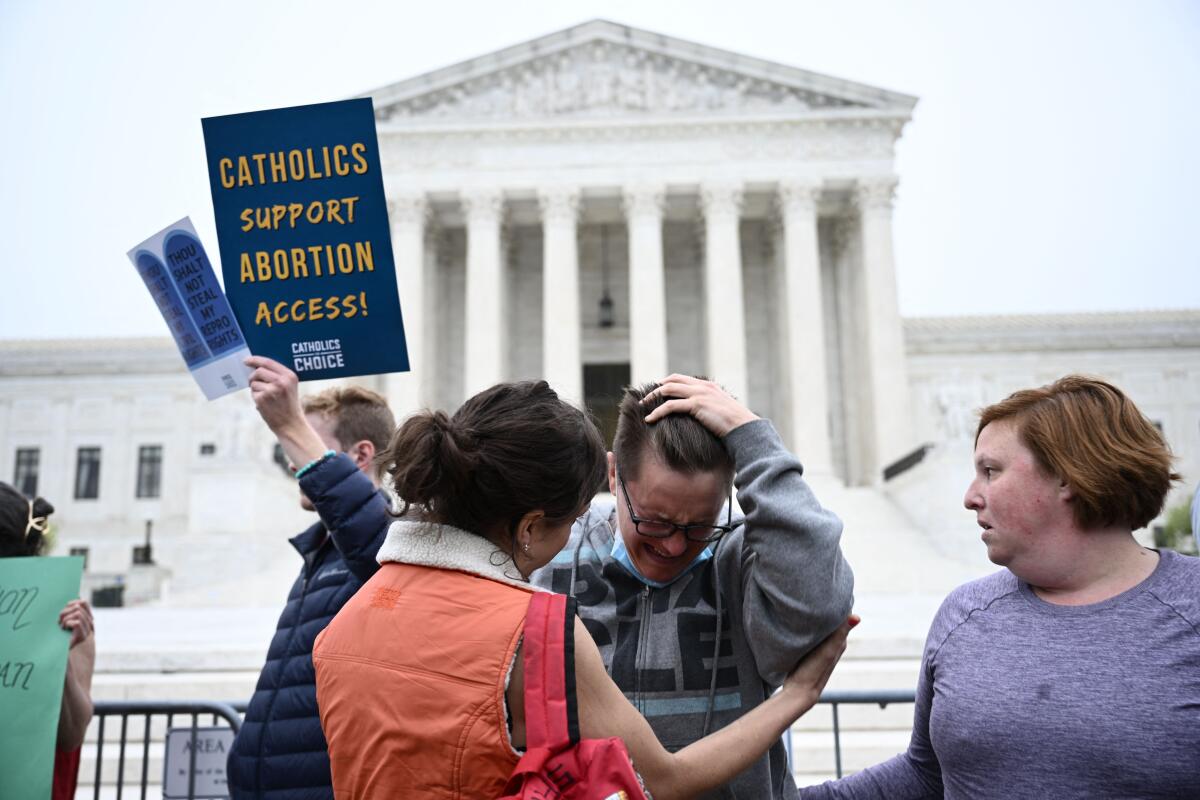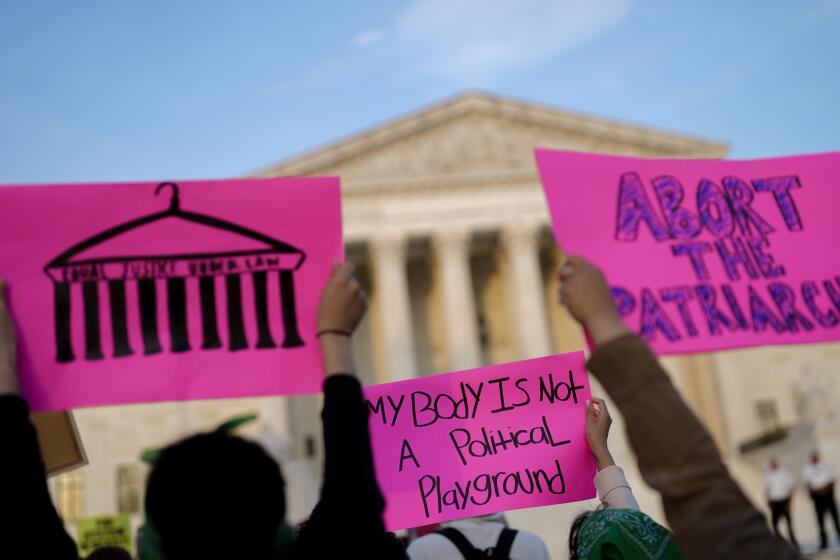Column: Who may kill Roe vs. Wade? Mostly justices named by a president who lost the popular vote

- Share via
More than Congress or the White House, the Supreme Court may arguably be the most important government institution in the country, its decisions touching on virtually every facet of day-to-day life, as well as broader questions of how we govern ourselves, regulate business and exercise our faith.
The Supreme Court is also inarguably the least democratic of the three, and not just because its members enjoy lifetime tenure and never have to face voters.
By the narrowest of margins, five justices appear ready to overlook nearly 50 years of precedent and reverse the court’s landmark Roe vs. Wade decision legalizing abortion nationwide — a ruling, polls have consistently shown, favored by a majority of Americans.
Three of those justices were nominated by President Trump, who failed to win the popular vote. Each was then approved by a Senate that Republicans controlled, despite the fact the party has represented only a minority of the population for the past quarter-century.
The country was built on a system of checks and balances intended to protect the interests of the minority and ensure no despot could run roughshod. That helps explain why each state has two U.S. senators, regardless of population, and the president is elected by the electoral college and not a direct vote of the people.
It also explains why popular measures like gun control have stalled for decades in Congress, where lawmakers from smaller, rural states hold disproportionate sway.
The court’s pending decision in Roe vs. Wade may be the most emphatic, and damaging, expression of minority rule.
Abortion activists on both sides were preparing for an election battle, but the leak of Supreme Court draft opinion on Roe vs. Wade has sped up plans.
A leaked draft of the Supreme Court’s pending decision, written by Justice Samuel A. Alito Jr. — nominated by President George W. Bush after he scratched out reelection with 50.7% support — was acknowledged Tuesday as authentic by Chief Justice John G. Roberts Jr. He said the draft, first reported by Politico, “does not represent a decision by the court or the final position of any members on the issues in the case.”
But even if the eventual ruling is different from the version leaked Monday, or even if the court upholds Roe when its decision comes out sometime this summer — which is extraordinarily unlikely — it doesn’t really matter at this point. The political battle has been joined.
Already, questions about the legitimacy of the court as well as Congress and whether they reflect the will of the people have renewed calls to end the Senate filibuster, expand the nine-member Supreme Court and abolish the electoral college, each of which also seem exceedingly unlikely.
If the court does rule as expected, the country could be cleaved in half. Not metaphorically or politically, though the latter will surely be one consequence.
Rather, the nation will be divided between states that allow the procedure and those that outlaw abortion, including some that may ban the procedure even in the most extreme cases, involving rape or incest.
Most immediately, Democrats hope the expected ruling will provide the jolt the party needs to fend off an electoral disaster in November.
“A big part of what we have to do, frankly, is scare our side into turning out,” said Paul Maslin, a Democratic strategist. “And this issue may do that better than anything else we could have or will have.”
When liberal Justice Ruth Bader Ginsburg died just a few weeks before the November 2020 election, it seemed control of the Supreme Court would be central to the fight for the country’s future. Her replacement by Amy Coney Barrett solidified the court’s conservative majority and has apparently provided the fifth vote needed to overturn Roe, just as her opponents said it would.
(Trump’s two other nominees were Neil M. Gorsuch and Brett M. Kavanaugh, who seem ready to join Barrett, Alito and Justice Clarence Thomas in reversing Roe vs. Wade.)
Democrats were outraged at Barrett’s hasty Senate confirmation — especially after Republican leader Mitch McConnell prevented President Obama from filling an earlier vacancy — and they predicted his hypocrisy would put the high court front and center in the presidential race.
That didn’t happen.
Scarcely more than 1 in 10 voters cited the Supreme Court as the most important factor in their decision, according to exit polling, and of those a majority voted to reelect Trump.
This time will be different, Democrats insist, and some agree, because the threat to abortion rights is no longer an abstraction.
“A lot of voters thought, ‘It’s not going to happen here,’ ” even as a growing number of states across the country passed increasingly restrictive antiabortion laws, said Republican pollster Christine Matthews. “This is a bomb going off in front of everyone who now recognizes, yes it could happen here.
“I know of a college-age daughter who texted her mom when the decision leaked and both were outraged,” said Matthews. “It could motivate a lot of young women who can’t even imagine life before Roe.”
All evidence suggests that Democrats will lose their narrow House majority in November, whatever action the court takes.
But control of the 50-50 Senate, which is much more up in the air, could hinge on whether the overturning of Roe boosts turnout of Democratic-leaning young voters — who have been notably lukewarm toward President Biden — and women who decide that inflation and pandemic-related anxieties are less important than keeping abortion legal and readily available where they live.
President Biden, averse to the culture wars and elected in part on a promise to ease political divisions, may see his presidency defined by the Supreme Court’s overturning of Roe vs. Wade — a historic ruling with huge political and practical implications.
More broadly, Matthews suggested, the anticipated decision could give Democrats a new and better framework for their uphill fight this difficult election season, turning the midterms from a referendum on Biden and his travails into a message that Republicans “want to take the country back to where whites were more equal than blacks, we banned books, women couldn’t get abortions or birth control, and gays couldn’t get married or be parents.”
At least Democrats can try.
(Republicans and their supporters, already eager to punish Biden and congressional Democrats, don’t need much incentive to turn out. The reversal of Roe would be the reward for half a century of unrelenting effort that has been foundational to conservative activism.)
In truth, the full impact of the Supreme Court’s probable decision is unknowable.
But one thing seems all but certain: Faith in our government will continue to decline, and a country already angry and divided will descend into more rage and recrimination as the reversal of Roe further undermines majoritarian rule and feeds the image of the justices as nothing more than partisans in black robes.
More to Read
Get the latest from Mark Z. Barabak
Focusing on politics out West, from the Golden Gate to the U.S. Capitol.
You may occasionally receive promotional content from the Los Angeles Times.













